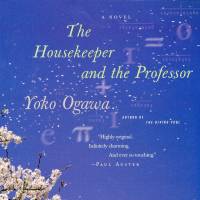Yoko Ogawa's "The Housekeeper and the Professor" garnered instant acclaim when it was published in 2003, winning the Hon'ya Taisho award. Translated into English in 2009 by Stephen Snyder, this short tale has steadily gained fans worldwide, making it a modern Japanese classic.
The Housekeeper and the Professor, by Yoko Ogawa, Translated by Stephen Snyder.
Picador, Fiction.
The book's protagonist is a math professor who is also a baseball fanatic despite having never seen a game. He loses his long-term memory due to injuries sustained in a car accident and with only 80 minutes of short-term recall, expresses himself through mathematics and baseball — the two things he remembers clearest. His suit is decorated with reminder notes as he reintroduces himself each day to his housekeeper and her young son whom the professor has nicknamed "Root." A tender relationship unfolds between 10-year-old Root and the professor, eloquently summarized in the novel by the mathematical equation known as Euler's formula. As the professor counsels, "eternal truths are ultimately invisible, and you won't find them in material things or natural phenomena, or even in human emotions. Mathematics, however, can illuminate them, can give them expression — in fact, nothing can prevent it from doing so." Using the housekeeper as narrator, Ogawa gently unfolds an elegant, charming equation for success, leaving the reader to muse about loss, memory and the magic of mathematics.
Read archived reviews of Japanese classics at jtimes.jp/essential.



